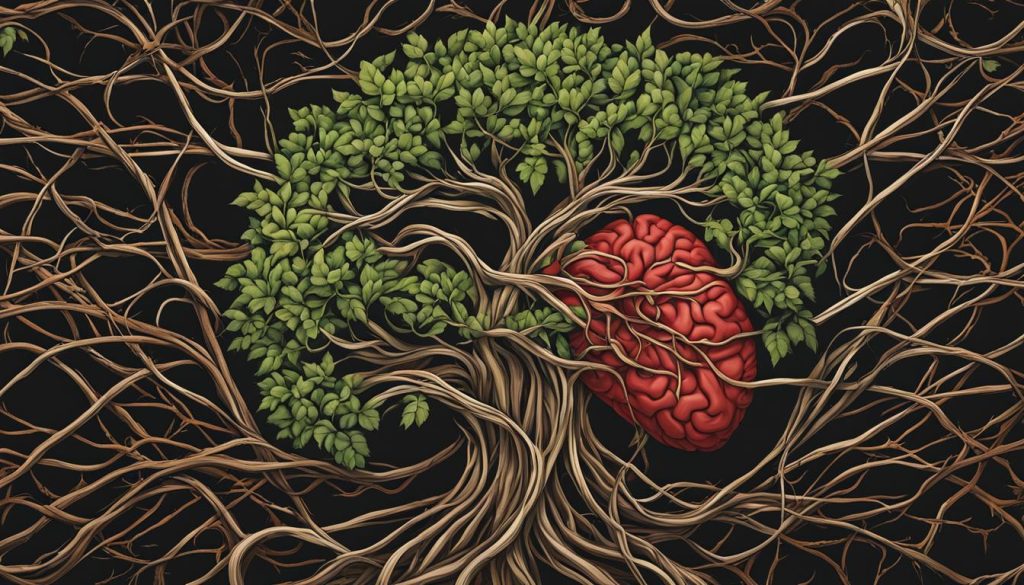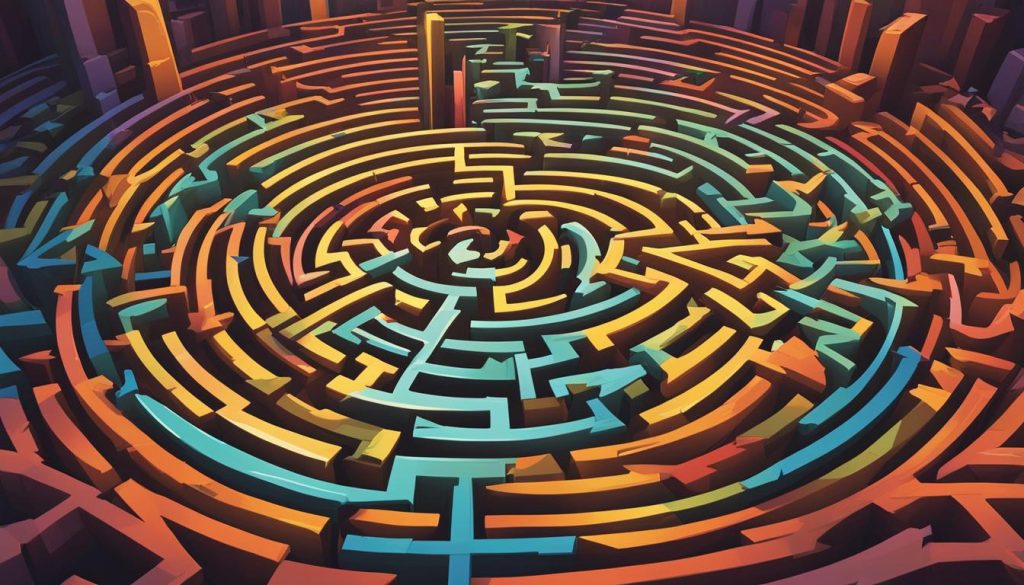Recovering from addiction and mental illness is a transformative journey that requires courage, determination, and the right support. It is a path that is filled with both challenges and milestones, but one that offers the opportunity for profound growth and healing.
On this healing journey, individuals embark on a quest to overcome addiction and manage their mental health. It starts with a decision to improve one’s life and seek the necessary support. This support can come in the form of addiction recovery programs, mental health services, therapy, self-help strategies, and holistic healing approaches.
There are various treatment options available for addiction, ranging from inpatient rehabilitation programs to outpatient counseling sessions. These options allow individuals to find the most suitable approach that addresses their unique needs and circumstances. It may involve finding the right diagnosis, relieving severe symptoms, and building a support network that includes therapists, counselors, and support groups.
As progress is made, individuals can regain stability and live an active life based on their desires and abilities. Therapy for addiction and mental illness plays a crucial role in this journey, equipping individuals with coping mechanisms, self-help strategies, and the skills to manage and overcome challenges they may face along the way.
Key Takeaways:
- Overcoming addiction and mental illness is a challenging journey that requires support and determination.
- Treatment options for addiction include inpatient rehabilitation, outpatient counseling, and support groups.
- Therapy for addiction and mental illness equips individuals with coping mechanisms and self-help strategies.
- Holistic healing approaches can play an important role in the recovery process.
- Building a support network is essential for long-term success in managing addiction and mental health.
Understanding the Link Between Mental Illness and Addiction

Mental illness and addiction often go hand in hand, creating a complex and challenging battle for individuals. Many people with mental health struggles turn to substance abuse as a way to self-medicate and cope with their underlying conditions. Unfortunately, this self-medication only perpetuates the cycle of addiction and exacerbates mental health issues.
Recognizing the link between mental illness and addiction is crucial for effective treatment and recovery. When both conditions coexist, they are referred to as co-occurring disorders. Treating these disorders simultaneously is essential for successful long-term recovery and improved well-being.
One of the key factors in understanding the link between mental illness and addiction is addressing the underlying causes. Mental health struggles can stem from a variety of factors, including genetic predisposition, trauma, environmental stressors, or a combination of these. By identifying and addressing these underlying causes, individuals can find relief from both addiction and mental health symptoms.
Holistic care plays a significant role in the recovery process. Holistic care approaches treatment from a comprehensive perspective, considering the physical, mental, and emotional well-being of individuals. It involves addressing the root causes of addiction and providing integrated treatment that attends to mental health issues.
“The connection between mental illness and addiction is a complex one. Treating both conditions concurrently is crucial for successful recovery.” – Dr. Emma Johnson, Psychiatrist
By adopting holistic care practices, individuals can benefit from a personalized treatment plan that incorporates evidence-based therapies, lifestyle changes, and support systems. This comprehensive approach helps individuals gain a deeper understanding of their mental health challenges and develop strategies for long-term recovery.
Table: Co-occurring Mental Illness and Addiction Statistics
| Mental Illness Condition | Prevalence in Substance Abuse |
|---|---|
| Depression | 40-60% |
| Anxiety disorders | 20-30% |
| Bipolar disorder | 40-60% |
| Post-Traumatic Stress Disorder (PTSD) | 50-75% |
| Schizophrenia | 50% |
Source: National Alliance on Mental Illness (NAMI)
Evidence-Based Approaches for Overcoming Addiction and Mental Illness

Utilizing evidence-based practices is essential for effective treatment of addiction and mental illness. These practices provide a scientific framework for evaluating treatment effectiveness and ensure that individuals receive the best possible care.
Evidence-based approaches in therapy have been proven to be effective in addressing mental health and addiction issues. Some of the most widely recognized and studied therapies include:
- Cognitive-Behavioral Therapy (CBT): This therapy helps individuals identify and change negative thought patterns and behaviors that contribute to addiction and mental health struggles. By learning healthier coping mechanisms and developing new skills, individuals can better manage their emotions and make positive changes in their lives.
- Dialectical Behavior Therapy (DBT): DBT focuses on teaching individuals mindfulness, emotion regulation, interpersonal effectiveness, and distress tolerance. This comprehensive approach helps individuals develop skills to navigate difficult emotions and relationships, reducing the risk of relapse.
- Eye Movement Desensitization and Reprocessing (EMDR): EMDR is particularly effective in addressing trauma-related disorders. This therapy helps individuals process traumatic memories and reduce the distress associated with them, leading to improved overall well-being.
These evidence-based therapies promote personalization, consistency, and continual improvement in treatment outcomes. By using proven therapeutic approaches, mental health professionals can provide effective care that addresses the unique needs of each individual.
Research has consistently shown the effectiveness of evidence-based therapies in treating addiction and mental illness. By incorporating these proven therapies into personalized treatment plans, individuals have a greater chance of achieving lasting recovery and improved mental well-being.
Table: Comparison of Evidence-Based Therapies for Addiction and Mental Illness
| Therapy | Description | Benefits |
|---|---|---|
| Cognitive-Behavioral Therapy (CBT) | Aims to identify and change negative thought patterns and behaviors contributing to addiction and mental health issues. |
|
| Dialectical Behavior Therapy (DBT) | Focuses on teaching mindfulness, emotion regulation, interpersonal effectiveness, and distress tolerance. |
|
| Eye Movement Desensitization and Reprocessing (EMDR) | Helps process traumatic memories and reduce the distress associated with them. |
|
The Importance of Individualized Treatment for Addiction and Mental Illness
When it comes to overcoming addiction and managing mental illness, individualized treatment is essential. Each person’s journey is unique, and tailoring treatment to their specific needs can make all the difference in their recovery. By addressing the root causes and providing holistic care, we can help individuals achieve lasting healing and transformation.
Individual Therapy: Personalized Approach for Lasting Change
Individual therapy plays a pivotal role in addiction recovery and mental health treatment. It offers a safe and confidential space for individuals to explore their thoughts, emotions, and behaviors. Through one-on-one sessions, therapists can delve into the underlying causes of substance use and mental health struggles, helping individuals gain insight and develop coping strategies tailored to their specific challenges. By addressing the root causes, individual therapy provides a solid foundation for lasting change and recovery.
Group Therapy: Support and Accountability
In addition to individual therapy, group therapy plays an important role in the recovery process. Group sessions provide a supportive environment where individuals can connect with others who have similar experiences. Sharing stories, challenges, and successes with others who understand can foster a sense of belonging and reduce feelings of isolation. Group therapy also offers accountability, allowing individuals to learn from each other and hold one another responsible for their actions and commitments.
Family Therapy: Healing Relationships
Addiction and mental illness not only affect individuals but also impact their families and relationships. Family therapy provides an avenue for healing and rebuilding trust and communication. By including loved ones in the treatment process, family therapy helps address dysfunctional dynamics, improve understanding, and strengthen support systems. Healing these relationships is crucial for long-term recovery and creating a supportive environment for the individual’s ongoing well-being.
Holistic Care: Addressing Root Causes for Comprehensive Healing
“Holistic care recognizes that addiction and mental illness are often rooted in a combination of biological, psychological, and social factors. By addressing all aspects of an individual’s life, including their physical health, emotional well-being, and social connections, holistic treatment can lead to comprehensive healing and lasting recovery.” – Dr. Sarah Miller, Psychologist
Addressing the root causes of addiction and mental illness is vital for effective treatment. Holistic care focuses on the whole person, not just the symptoms, and aims to restore balance and well-being in all areas of life. This approach may include alternative therapies, such as yoga or art therapy, as well as lifestyle changes and stress management techniques. By taking a comprehensive and individualized approach, holistic care offers a path to true healing and long-term recovery.
Coping Mechanisms and Support for Overcoming Addiction and Mental Illness
When facing the challenges of addiction and mental illness, developing healthy coping mechanisms is crucial. These coping mechanisms can provide individuals with the tools they need to overcome obstacles and manage their well-being. Here are some effective strategies:
1. Self-Care
Practicing self-care is vital for maintaining mental and emotional well-being. Taking time for oneself and engaging in activities that promote relaxation, self-reflection, and self-compassion can have a positive impact on overall mental health. This can include activities such as:
- Taking walks in nature
- Engaging in creative outlets, such as painting or writing
- Practicing mindfulness and meditation
2. Mindfulness
Mindfulness activities and techniques can help individuals develop greater awareness and acceptance of their thoughts, emotions, and sensations. By practicing mindfulness, individuals can learn to cultivate a sense of calm and reduce stress. Some mindfulness practices include:
- Deep breathing exercises
- Body scans
- Mindful eating
3. Support Groups
Support groups provide a safe space for individuals to share their experiences, gain support from others who have faced similar challenges, and learn from each other. These groups can be a valuable source of encouragement and understanding. Support groups can be found in local communities and online platforms.
“Being part of a support group has been transformative for me. It’s so comforting to know that I’m not alone in my journey and that others truly understand what I’m going through.”
4. Resources
There are numerous resources available to support individuals on their journey to recovery. These resources may include educational materials, self-help books, online forums, and helplines. Utilizing these resources can provide valuable information and guidance.
To access reliable and credible resources related to addiction and mental illness, individuals can reach out to organizations such as the National Institute on Drug Abuse and the National Alliance on Mental Illness.
5. Medication-Assisted Treatment
For individuals struggling with addiction and mental illness, medication-assisted treatment can be an effective approach. Medications prescribed by healthcare professionals, when combined with therapy and support, can help manage symptoms and improve overall well-being.
| Treatment | Description |
|---|---|
| Coping Mechanisms | Healthy strategies to deal with challenges and stressors |
| Self-Care | Activities that promote relaxation, self-reflection, and self-compassion |
| Mindfulness | Practices that cultivate awareness and acceptance |
| Support Groups | Safe spaces for individuals to connect, share, and gain support |
| Resources | Educational materials, books, forums, and helplines |
| Medication-Assisted Treatment | Prescribed medications combined with therapy and support |
Conclusion
Overcoming addiction and mental illness is a challenging but achievable journey. By utilizing evidence-based treatment approaches, addressing underlying causes, and seeking support and resources, individuals can embark on a healing journey towards holistic recovery.
Recovery is a process, and it is important to remember that seeking help and support is a sign of strength. With determination, resilience, and the right support, it is possible to overcome addiction and mental illness and lead a fulfilling life.
Remember, evidence-based treatment methods provide a scientific framework for evaluating effectiveness, ensuring that individuals receive the best possible care. Holistic healing, which considers the mind, body, and spirit, plays a vital role in recovery by addressing the root causes of addiction and mental illness.
Support and resources are available to assist individuals on their journey. Whether it’s therapy, support groups, hotlines, or online forums, reaching out for help is an important step towards recovery. With the right tools and guidance, individuals can regain stability, embrace their true potential, and live a life free from the grips of addiction and mental health struggles.
FAQ
What is the first step in overcoming addiction and mental illness?
The first step is making the decision to improve your life and seek support. It’s essential to recognize that the process takes time, but positive changes can happen along the way.
How do mental health struggles and addiction relate to each other?
Mental health struggles often coexist with addiction, creating a complex battle. Substance abuse can be a way to self-medicate and cope with underlying mental health conditions, but treating both simultaneously is crucial for successful recovery.
What are evidence-based approaches for overcoming addiction and mental illness?
Evidence-based practices like Cognitive-Behavioral Therapy (CBT), Dialectical Behavior Therapy (DBT), and Eye Movement Desensitization and Reprocessing (EMDR) have been proven effective in addressing these issues and promoting personalized and consistent care.
Why is individualized treatment important for addiction and mental illness?
Individual therapy allows for a personalized approach to address underlying causes, while group therapy provides social support, and family therapy helps heal relationships affected by addiction. Tailoring treatment ensures the best possible outcome for recovery.
What coping mechanisms and support are available for overcoming addiction and mental illness?
Developing healthy coping mechanisms like self-care, mindfulness, and support from peers and professionals can help. Therapy, support groups, hotlines, and online forums are resources available, and medication-assisted treatment can also be beneficial when used alongside other forms of treatment.

